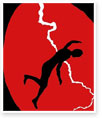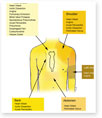|
If you are having severe pain, crushing, squeezing, or pressure in your chest that lasts more than a few minutes, or if the pain moves into your neck, left shoulder, arm, or jaw, go immediately to a hospital emergency department.
Any part of the chest can be the cause of the pain including the heart, lung oesophagus, bone, and skin.
Potentially life-threatening causes of chest pain are as follows:
- Heart attack
- Angina
- Aoritc Dissection
- Pulmonary embolism
- Spontaneous pneumothorax
- Perforated viscus
- Cocaine-induced chest pain
- Acute pericarditis
- Mitral valve prolapse
Heart Attack Symptoms
Typical heart attack pain occurs in the mid to left side of the chest and may also extend to the left shoulder, the left arm, the jaw, the stomach, or the back.
- Other associated symptoms are shortness of breath, increased sweating, nausea, and vomiting.
- Symptoms vary considerably from person to person.
- Women may experience symptoms of heart attack similar to men (chest pain), but they also may be more atypical. Atypical symptoms include:
- Pain radiating to neck
- Jaw
- Shoulder
- Upper back abdominal discomfort
- Shortness of breath
- Sweatiness
- Unexplained fatigue
Angina Symptoms
Angina is similar to heart attack pain but occurs with physical exertion or exercise and is relieved by rest or nitroglycerine
- Angina becomes life threatening when pain occurs at rest, has increased in frequency or intensity, or is not relieved with at least three nitroglycerin tablets taken five minutes apart.
- This is considered to be unstable angina, which may be a warning sign of an impending heart attack.
- While waiting for the ambulance, have the patient chew two baby aspirin or at least half of a regular aspirin - at least 160 mg. There is no evidence that taking more than this helps more, and the patient could have unwanted side effects if they take too much.
- It is important to chew the aspirin before swallowing it because chewing decreases the time the medicine takes to have an effect.
- Chewing an aspirin in the early stages of a heart attack may reduce the risk of death and it may also reduce the severity of the attack.
Angina
If the patient has had angina and has nitroglycerin tablets available, have the patient place one under the tongue. This may aid in increasing blood flow to blocked or narrowed arteries.
- If the chest pain continues in the next five minutes, take another tablet under the tongue.
- If, after three nitroglycerin tablets, the patient does not have relief of the chest pain, immediately call emergency or go to the nearest emergency department.
Outlook
Early medical intervention improves survival in potentially life-threatening illnesses involving chest pain.
 
For further information contact: www.eehealthbook.com
|